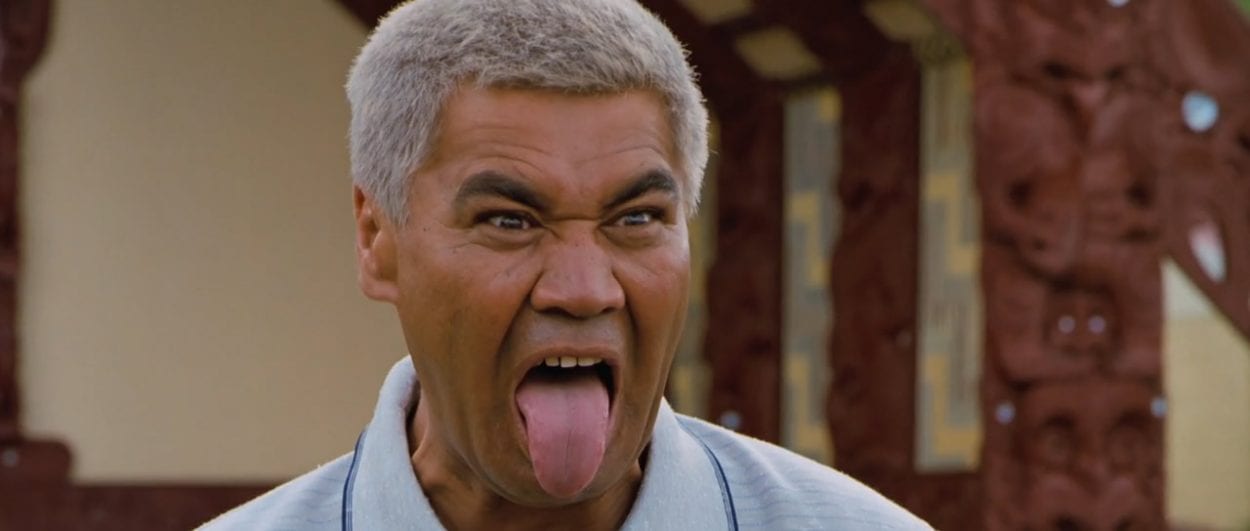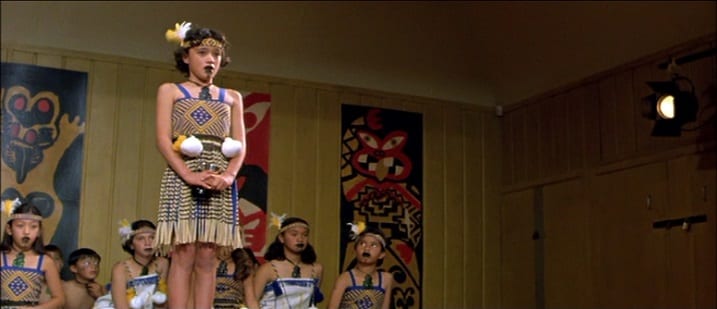It had been a long time since I had last watched Whale Rider, the incredible drama from New Zealand that is based on the Witi Ihimaera’s novel of the same name. There are so many elements of the tale of a little girl trying to find her place in the world that I had forgotten about. Whale Rider is just a beautifully told, intimate story about family, legacy, and the aforementioned little girl who wants nothing more than to please her grandfather and continue the family line of Chieftans that she derives from.
The way Whale Rider interweaves the epic tales of the character’s ancestors with the humble, almost run-down nature of their current environment is excellently done. This is the reason for the backward thinking of the elders of the Maori people in this little town. They long for times gone by, yearning so much to be like the heroes from their stories. The elders like Koro (Rawiri Paratene) wanted to feel one with nature again just like their forefathers who braved the turbulent seas to make their way to their homeland.
Koro, the leader of the clan longs for the days of old—he wants nothing more than to bring some pride back into their village. His mission is to find the next Chieftan, to rekindle that warrior spirit in the youth of their people. Koro is a traditionalist; his dedication to maintaining the cultural heritage of his people is his defining quality. It is this dedication that fuels him, and it has made it his life’s work to pass on the knowledge to the next generation. Koro is so important to his people; it is the elders like him that will keep the traditions and customs alive.

Even though Koro’s role in the community is without question and the importance of his teachings is so necessary for the young to remember their roots, some negatives come from holding onto a doctrine from another time. What I mean by that is if you hold too tightly on what came before then you might not be willing to loosen your grip to make room for what is yet to come. The future needs a little wiggle room if it too is to become part of the fabric of a people. It too will soon be the past and has to be allowed its opportunity to take its rightful place in the lineage of all the other tales of their people.
The future I speak of is the little girl of the story Paikea, who has been scorned from birth for nothing more than the fact that she was not born a boy. Koro sees this as the breaking of a chain that goes as far back as the original whale riders. He doesn’t see his granddaughter as the gift she is; instead, he views her as a representation of not just his son’s failings but his own failings also. The reaction to Paikea’s birth is, unfortunately, a sad indictment of male-dominated tribal communities. It shows us that even is these marginalized cultures that there is an, even more, marginalize people within its own ranks.
Paikea’s journey is a perfect example of this. She is clearly every bit as smart as she is strong. Her grace and spirituality belie her young age. Paikea wants nothing more than to be accepted, by her father, by her grandfather, and by her culture as a whole. She does not want to be cast-off to one side simply because of what was written before, the stories that have ignited her passion for her ancestors is not the law to her, it is an inspiration. Paikea does not want to be bound by these tales; on the contrary, she wants them to set her free to write her own stories.
Her struggle for acceptance is equal parts inspirational as it is gut-wrenching. I had forgotten how heartbreaking Paikea’s story really is, every time she takes a step forward, she is shoved back down to the ground with the hardest of thuds. Niki Caro toys with the audience in these moments of Paikea’s journey, just when you think this brave little girl finds her footing that is when she will have to take the hardest of hits. Even though these scenes are incredibly hard to watch and jerk many a tear, they are so important in showing Paikea’s warrior spirit, that the power of her people flow through her veins, giving her the strength she needs to carry on.
When Paikea has to give her speech near the climax of Whale Rider, we get not only to see the strength of the character but also the young actor who plays her. Keisha Castle-Hughes delivers each line with maximum effect, and this was another scene that sneaks up on you. Watching this young girl’s heartbreak but also her bravery as she battles on, reciting the speech that is dedicated to her absentee grandfather Koro. This scene shows you everything that Paikea’s is within a microcosm of a few short moments. Just like her journey, this moment is soul-crushing but at the same time incredibly empowering.

She faces the abandonment she knows all too well, even though her heart is breaking—believe me your heart breaks with her too—she does not allow it to conquer her. Just like in life, she keeps moving forward, letting the words of her forefathers give her the strength she needs. Apart from the scene where she rides the whale, this is the most powerful scene in the entire movie. When the whale carries her away, it is such a beautifully shot sequence, backed with an equally beautiful score, it is a moment of pure triumph for Paikea and is the fulfilment of her destiny.
Although the climactic scene when Paikea finally rides the whale is impeccably done, it is the scene where she gives the speech that imbues her with the strength she needs to fulfil the destiny that awaits her. Whale Rider is like this throughout, the director Niki Caro uses the pain of Piakea’s journey to help her build the resolve she will need for the bigger moments in her life. Every obstacle she faces and has to clamber over will only make her all the more prepared for what has to be done when the time comes.
Caro lays the groundwork for Paikiea’s journey so expertly, each painful brick in the path to her destiny is delicately put into place. The brave little girl with have to traverse these painstakingly placed agonies, that are etched into every fibre of her being, she will have to be broken down before she will be built back up into something new entirely. This outcast, who was once shunned will now shine, finally able to take her place, standing shoulder to shoulder with her ancestors.




I am not in agreement at all with Vincent Greene in his commentary about the movie ‘Whaler Rider’.
Continually referring to the character of the rightful leader as ‘the little girl’ does no justice to the essence of ‘Whale Rider’.
This true leader takes a great deal of punishment from her harsh grandfather whose heart lacks true wisdom and intuition.
In the last section of the film, when the grandfather is sitting with the true leader of the tribe, he has learned humility and truth and calls her ‘Wise Leader’.
As with true spiritual leaders, she undergoes a stern testing, and shows the true nature of her inner knowledge that she is the chosen one to be the next leader. This knowledge does not allow her to rebel against her grandfather’s outrageous lack of recognition of who she really is. The last scene is intensely beautiful and reveals the cohesion within her tribe now that she has become the leader, supported by her grandfather. A final suggestion: a good editing especially of basics such as spelling by the writer would be welcome.